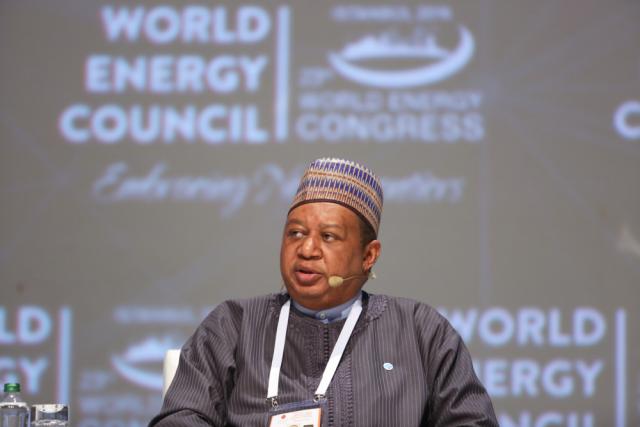
Mohammad Barkindo, 63, a veteran of the oil industry, was due to step down at the end of this month after six years in the top job at OPEC. Pictured, Barkindo at the 23rd World Energy Congress in 2016. (Source: Prometheus72 / Shutterstock.com)
OPEC Secretary-general Mohammad Sanusi Barkindo, an iconic figure within the organization and across the oil industry, died on July 5 in his home country of Nigeria, according to details revealed by the oil producing group.
“It is with immense sorrow and sadness that the OPEC Secretariat learnt of the passing of the OPEC Secretary-general, His Excellency, Mohammad Sanusi Barkindo,” OPEC announced July 6 in a press statement. “He was the much-loved leader of the OPEC Secretariat and his passing is a profound loss to the entire OPEC family, the oil industry and the international community.”
Barkindo assumed his leadership position at OPEC on Aug.1, 2016 and was set to step down later this month. Haitham Al-Ghais of Kuwait, a seasoned oil industry veteran and an astute diplomat, was the next in line to succeed Barkindo, according to OPEC.
“Barkindo was a visionary leader and an eloquent communicator who played [a] key role in forming the historic declaration of cooperation at the end of 2016. He served the organization with great distinction and helped it successfully navigate through two major industry downturns (2015-2016 and 2020-2021), was instrumental in the setting up of the charter of cooperation (CoC), and was a consummate diplomat in further advancing dialogue and cooperation with a variety of industry stakeholders,” OPEC added.
Industry “Under Siege!”
Barkindo’s last appearance as secretary-general was on July 5 at the 21st edition of Nigeria Oil and Gas (NOG) Conference and Exhibition in Abuja, Nigeria. There he delivered a keynote address that spanned issues from energy industry challenges and the importance of the oil sector to the urgency of eradicating energy poverty.
“If our NOCs are to continue to innovate and flourish, it is of utmost importance that they have predictable and unfettered access to investment capital… yet our industry is now facing huge challenges along multiple fronts, and these threaten our investment potential now and in the longer term,” Barkindo said in his opening ceremony comments posted on OPEC’s website. “To put it bluntly, the oil and gas industry is under siege!”
Barkindo reiterated that cumulative investments of $11.8 trillion were needed in the upstream, midstream and downstream sectors through 2045 despite the energy transition push amid a need to fulfill growth in energy demand. He said that “years of underinvestment in the oil sector help explain the current market tightness and razor-thin spare capacity margins.”
In regards to additional barrels that could be added to the market, Barkindo argued that the global oil market could “unlock resources and strengthen capacity” if oil producers Iran and Venezuela were allowed to return to the market. Barkindo added: “as we know, their oil industries have been held hostage by geopolitics, while Libya has faced internal challenges that have at times sharply curbed its exports.”
“Unfortunately, the disruptions affecting these three OPEC member countries not only contribute to the current market tightness, they directly affect the welfare and development of these great nations,” Barkindo said.
Barkindo’s Career
Barkindo’s career in the oil industry began in Nigeria in the early 1980s. He served in various capacities at the Nigerian National Petroleum Corp. (NNPC) and represented Nigeria on OPEC’s economic commission board.
He was acting OPEC secretary-general in 2006 before returning to the position 10 years later and has led the organization through a turbulent oil market period including steering it towards greater cooperation with non-OPEC oil producers.
After leaving OPEC, Barkindo was due to join U.S. think tank the Atlantic Council’s Global Energy Center as a distinguished fellow, the Council recently announced.
Editor’s note: This story was updated from a previous version posted at 4:20 a.m. CT on July 6. Reuters contributed to this article.
Recommended Reading
What's Affecting Oil Prices This Week? (Jan. 29, 2024)
2024-01-29 - For the upcoming week, Stratas Advisors forecast that increase in oil prices will be moderated likely due to the U.S. being cautious in response to the recent attack on U.S. troops.
Paisie: Economics Edge Out Geopolitics
2024-02-01 - Weakening economic outlooks overpower geopolitical risks in oil pricing.
What's Affecting Oil Prices This Week? (Feb. 5, 2024)
2024-02-05 - Stratas Advisors says the U.S.’ response (so far) to the recent attack on U.S. troops has been measured without direct confrontation of Iran, which reduces the possibility of oil flows being disrupted.
What's Affecting Oil Prices This Week? (March 4, 2024)
2024-03-04 - For the upcoming week, Stratas Advisors expect the price of Brent will move sideways and will struggle to break through $85.
Oil Broadly Steady After Surprise US Crude Stock Drop
2024-03-21 - Stockpiles unexpectedly declined by 2 MMbbl to 445 MMbbl in the week ended March 15, as exports rose and refiners continued to increase activity.





